Thu 15 Dec 2011
Mike Nevins on BERNARD HERRMANN, JACQUES BARZUN, ANTHONY BOUCHER and JOHN RHODE.
Posted by Steve under Authors , Columns[6] Comments
by Francis M. Nevins
Within five months, five deaths: my wife, my youngest brother, my longtime agent, my editorial partner on the “Mystery Makers” series, and the secretary without whose gentle mentoring I’d still be batting out words on a manual typewriter. I’ll never remember this year fondly. But before it closes, and before next January 6 when I collide with my 69th birthday, I’d like to begin writing again.
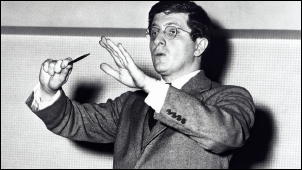
In a column that dates back to before any of those deaths, I mentioned that some of the music Bernard Herrmann wrote for the earliest episodes of the CBS Adventures of Ellery Queen radio series could be seen on the Herrmann Society website. Now it can be heard too. If you go to www.filmscorerundowns.net and then click on “CBS Audio Clips,†you’ll be able to listen to 21 Herrmann excerpts, most of them unavailable elsewhere.
Two of the three earliest come from the 60-minute Ellery Queen episode “The Last Man Club†(June 25, 1939) and the third from “The Impossible Crime†(July 16, 1939), all three performed on a synthesizer by David Ledsam. Even without the original instrumentation, the 31-second Cue 1 from “The Last Man Club†is instantly recognizable as Herrmann, although the other two lack the uniquely ominous sound that he became famous for.
But it’s hauntingly present in the vast majority of these 21 audio clips, and anyone who listens to all of them will perhaps understand why I’ve called Herrmann the Cornell Woolrich of music.
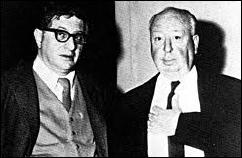
You can listen to dozens more audio excerpts, many from legendary TV series like Perry Mason and Have Gun Will Travel and Gunsmoke, if you visit www.bernardherrmann.org and then click on “Herrmann CBS Legacy.†Both of these centenary tributes to perhaps the greatest of all film composers were prepared and arranged by Herrmann authority Bill Wrobel.
As chance would have it, Herrmann and Queen interfaced again almost a quarter century after the Queen radio show debuted. “Terror in Northfield†(October 11, 1963), one of 17 episodes of The Alfred Hitchcock Hour with original Herrmann scores, was based on a non-series novelet by Queen.
Herrmann’s music for that and eight other episodes of the series is available on three CDs in the recently released Varese Sarabande set The Alfred Hitchcock Hour, Volume Two, which I recommend highly.
November 30 of this year marked the 104th birthday of the world-renowned historian of ideas Jacques Barzun, who in the early 1920s was a classmate of Woolrich at Columbia University and to whom we owe everything that is known about the young manhood of the Hitchcock of the written word.
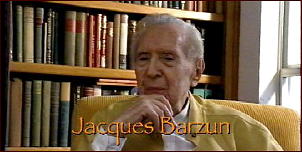
My first contact with Barzun was in the late Sixties when I arranged for his essay “Detection and the Literary Art†to be reprinted in my anthology The Mystery Writer’s Art.
We met in 1970 when I was living in New Jersey and working on the Woolrich collection Nightwebs. Barzun invited me to his office in Columbia’s Low Library and spent the better part of an afternoon describing for me what the university was like in the years immediately after World War I and also, of course, what the young Woolrich was like.
The factor that seems to have brought the two together was that they were the only members of their class who had spent most of their lives outside the United States, Barzun in France and Woolrich in Mexico with his father.
Their friendship came to an end when Woolrich sold his first novel to a major publisher while in junior year and quit Columbia under the delusion that he was about to become the next F. Scott Fitzgerald. He wound up one of the founders and the supreme practitioner of the dark suspense genre we now call noir.
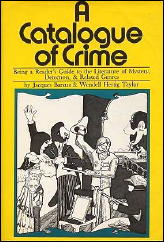
Woolrich’s brand of desperate anguish was not Barzun’s cup of tea. His mammoth Catalogue of Crime (2nd ed. 1989) makes it clear that he much preferred humdrum English authors like John Rhode.
I had read some Rhode and also another humdrum Brit signing himself Miles Burton, and had noticed something very strange about both sets of books. Whenever a character asks a question of another, the verb following the second character’s line of dialogue is always the same. Always.
Hundreds of times in each book, hundreds of thousands of times in the complete works. “ABC?†asked Inspector Boothbridge. “XYZ,†Lord Wychthorpe replied. “One two three?†Dr. Coxcroft inquired. “Eight nine ten,†Mrs. Hornbeam replied.
The obvious conclusion is that Rhode and Burton were the same man, but apparently no one had mentioned it before me (in The Armchair Detective for October 1968). At any rate Barzun in Catalogue of Crime credited me with the discovery.
Among those who weren’t aware of the Rhode-Burton identity was Anthony Boucher. He thought most of the Rhode books dull but usually reviewed them soberly, while the Burton novels he ridiculed and detested. Here’s his complete review of Death at Ash House from the San Francisco Chronicle for December 6, 1942:
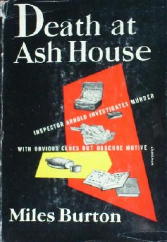
Here’s what he had to say about Accidents Do Happen in the Chronicle for February 10, 1946:
These and three more snarky reviews of Burton can be found in The Anthony Boucher Chronicles (2001). Burton’s American publisher dropped him before Boucher took over as mystery critic of the New York Times but they continued to appear in England until 1960.
The Rhodes kept coming out on both sides of the Atlantic and Boucher reviewed all of them, perhaps because as a Catholic he thought he should do penance for his sins. I remember he called one of them “the dreariest Rhode I have yet traversed.†I can’t recall anything about the book of which he said it.
December 15th, 2011 at 2:52 pm
I cite Boucher reviews (all included in Mr. Nevins’ recent collection) in my forthcoming Humdrums book (Masters of the “Humdrum” Mystery) that are much more favorable to John Street than Mr. Nevins’ assessment above indicates.
On Men Die at Cyprus Lodge (1943):
“At his best, nobody can touch Rhode for ingenious murder gadgets and few can top him for meticulous unraveling; he’s very close to his best in this one.”
On Vegetable Duck (1944):
“Poisoned vegetable marrow starts a trail of almost unbelievably ingenious false clues.”
On the very late Licensed for Murder (1958):
“The detection is competent; the murders have novelty and ingenuity to recommend them; and the background details on the management of a village inn are fascinating. Slow and heavy, but kind of nice.”
It doesn’t sound quite as if Boucher was doing penance for his sins in reading John Rhode.
Besides Boucher and Barzun, other critics who praised Rhode books include Dorothy L. Sayers, Francis Iles, Milward Kennedy, Isaac Anderson and Will Cuppy (the list could be continued). He was, indeed, a highly admired detective novelist in the Golden age of detective fiction.
Boucher was quite put out with a Miles Burton book (a good one) that made the murderer a member of the lower classes. I thought this was a critical lapse on his part. Boucher seemed to find it offensive (oddly, he seems in agreement with S. S. Van Dine, though for a different reason, that no lower class person should be a murderer in a detective novel). After that Bocuher tended to go after Miles Burton books with a hatchet, even as he praised some Rhodes.
Boucher made it sufficiently clear, I think, that he enjoyed books by the “British painstaking school,” including those by Rhode, Freeman Wills Crofts and J. J. Connington. He recognized that they were slower-paced, but he was a genuine lover of detection and ratiocination, just like Jacques Barzun, and enjoyed what the books offered in that respect.
December 15th, 2011 at 2:55 pm
Link to a post on my blog about my book and the “Humdrums”:
http://thepassingtramp.blogspot.com/2011/12/masters-of-humdrum-mystery.html
December 15th, 2011 at 3:01 pm
Oh, one other thing: I agree with Boucher’s assessment of the Miles Burton book Accidents Do Happen–it indeed is one of the poorest (Death at Ash House isn’t too great either). Boucher gave more praise (grudgingly) to Burton’s Not a Leg to Stand On. But there are a number of quite good Burtons from the 1930s and 1940s, that received critical praise at the time.
December 15th, 2011 at 4:02 pm
My recollection is that, by and large, Boucher thought much more highly of the Rhode novels of the 1940s, which he reviewed in the Chronicle, than he did of the novels of the Fifties, which he covered in the Times. And from my own reading I’d rank most Rhodes of the Forties higher than those of the Fifties.
December 15th, 2011 at 4:09 pm
I agree with you on both points. I was surprised Boucher was as sympathetic to Licensed for Murder as he was was, coming as it did so late in the day from Rhode. Most of the books after, say, 1953 or so even I do not recommend. Boucher is right though, I think, Licensed for Murder is about the best of the late Rhodes. Clearly the Rhode was closing, to continue the pun.
December 16th, 2011 at 2:49 pm
Changing the subject at this juncture — and I am glad to see that both you, Curt, and Mike are in agreement, more or less, on Rhode and Burton — I’d like to recommend everyone reading this to check out the links to the Bernard Herrmann websites that Mike provided.
I did, and I’d apparently left the volume turned up on my speakers, because the first audio file I clicked on (from a GUNSMOKE episode) nearly blasted me out of my chair.
In a good way, of course!
And a big PS to Mike: Welcome Back!